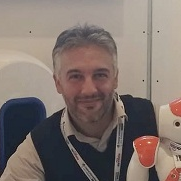Autism and Neurodevelopmental Disorders: The SARS-CoV-2 Pandemic Implications
A special issue of Brain Sciences (ISSN 2076-3425). This special issue belongs to the section "Developmental Neuroscience".
Deadline for manuscript submissions: closed (5 December 2021) | Viewed by 34571
Special Issue Editor
Interests: Autism; Neurodevelopmental Disorders; Psychology; Psychoterapy; Neurosciences; Precision Medicine
Special Issues, Collections and Topics in MDPI journals
Special Issue Information
Dear Colleagues,
The last months have been characterized by a new challenge known as SARS-CoV-2 or, as the general public is more familiar with, COVID-19. Our lives have changed dramatically due to the emergency of this virus, and the ways in which we work on a daily basis have also been modified. Among neuropsychiatric disorders, those with autism spectrum conditions (ASDs) have suffered a strong impact in terms of delays or interruptions in diagnosis and treatment settings (i.e., telemedicine) . The effects of COVID-19 on children, adolescents, and adults with ASD have been heterogeneous. This Special Issue titled “Autism and COVID-19: Issues and Opportunities” aims to present a collection of studies detailing the widest experiences possible in the field of autism and COVID-19. Authors are invited to submit cutting-edge research, case reports, survey results, and reviews on the following topics: screening, diagnosis, intervention/treatment, healthcare services, quality of life, psychological stress, emotional and behavioral modifications, adaptive behavior, psychopathology, sleep and/or nutrition changes, telemedicine, public policies, and ethical questions.
Dr. Antonio Narzisi
Guest Editor
Manuscript Submission Information
Manuscripts should be submitted online at www.mdpi.com by registering and logging in to this website. Once you are registered, click here to go to the submission form. Manuscripts can be submitted until the deadline. All submissions that pass pre-check are peer-reviewed. Accepted papers will be published continuously in the journal (as soon as accepted) and will be listed together on the special issue website. Research articles, review articles as well as short communications are invited. For planned papers, a title and short abstract (about 100 words) can be sent to the Editorial Office for announcement on this website.
Submitted manuscripts should not have been published previously, nor be under consideration for publication elsewhere (except conference proceedings papers). All manuscripts are thoroughly refereed through a single-blind peer-review process. A guide for authors and other relevant information for submission of manuscripts is available on the Instructions for Authors page. Brain Sciences is an international peer-reviewed open access monthly journal published by MDPI.
Please visit the Instructions for Authors page before submitting a manuscript. The Article Processing Charge (APC) for publication in this open access journal is 2200 CHF (Swiss Francs). Submitted papers should be well formatted and use good English. Authors may use MDPI's English editing service prior to publication or during author revisions.
Keywords
- COVID-19
- Autism
- Surveys
- Children
- Adults
Benefits of Publishing in a Special Issue
- Ease of navigation: Grouping papers by topic helps scholars navigate broad scope journals more efficiently.
- Greater discoverability: Special Issues support the reach and impact of scientific research. Articles in Special Issues are more discoverable and cited more frequently.
- Expansion of research network: Special Issues facilitate connections among authors, fostering scientific collaborations.
- External promotion: Articles in Special Issues are often promoted through the journal's social media, increasing their visibility.
- e-Book format: Special Issues with more than 10 articles can be published as dedicated e-books, ensuring wide and rapid dissemination.
Further information on MDPI's Special Issue polices can be found here.






